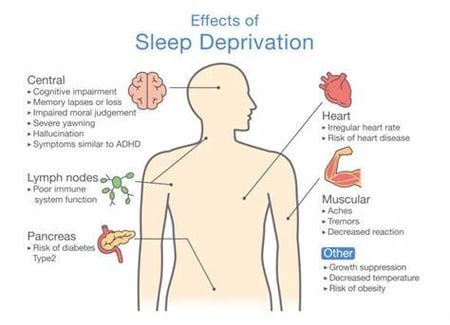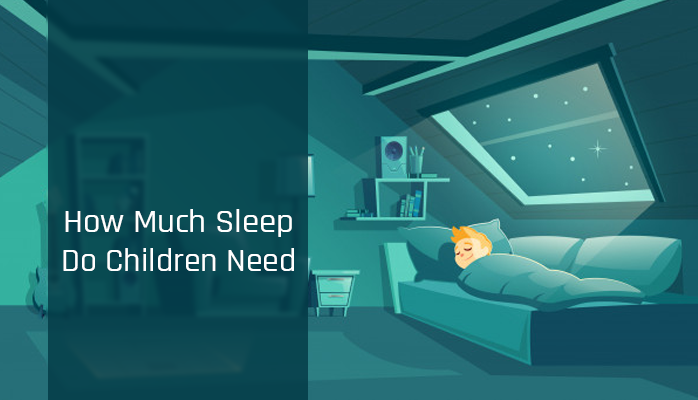How Much Sleep Do Children Need?
Children need more sleep than adults. The younger the child, the more sleep they need. Below is a guideline for the amount of recommended, minimum, and maximum amount of sleep your child should be getting based on their age [Sleep Foundation]. All children are different and have unique needs, hence there is a recommended number listed, and outside of that a minimum and maximum amount of sleep are listed as well:
- Newborns 0-4 months
- 11-19 hours per day; Recommended 14-17 hours per day
- Infants 4-12 months
- 10-18 hours per day; Recommended 12-15 hours
- Toddlers 1-3 years
- 9-16 hours per day; Recommended 11-14 hours
- Preschoolers 3-5 years
- 8-14 hours per day; Recommended 10-12 hours
- Adolescents 6-13
- 7-12 hours per day; Recommended 9-11 hours
- Teenagers 13-18 years
- 7-11 hours per day; Recommended 8-10 hours
It's important to try and establish what amount of sleep allows your child to perform best. When children don’t get enough sleep, they will experience sleep deprivation.
Signs of Sleep Deprivation in Children
 Children will show signs of sleep deprivation when they aren’t getting enough sleep. We are all familiar with terms like the “witching hour” when our children get sleepy. The defiant, crabby, and hyperactive behaviors that are characteristic of the witching hour are also remarkably the same signs children chronically show when they are suffering from sleep deprivation.
Children will show signs of sleep deprivation when they aren’t getting enough sleep. We are all familiar with terms like the “witching hour” when our children get sleepy. The defiant, crabby, and hyperactive behaviors that are characteristic of the witching hour are also remarkably the same signs children chronically show when they are suffering from sleep deprivation.
These signs of sleep deprivation in children include:
- Behavior that is consistent with ADHD signs
- Hyperactivity
- Difficulty concentrating
- Defiant behavior
- Impulsive behavior
- Excessive sleep on weekends
- Falling asleep during the day, such as at school
- Poor or erratic performance at school
- Hard time waking up in the morning
In fact, there is an increasing body of evidence from studies that children with chronic sleep problems can be misdiagnosed with ADHD (Shur-Fen Gau 2006).
Establishing Behavioral Baseline for Children
An important part of establishing whether or not your child is suffering from sleep deprivation is establishing a baseline of what behavior is normal for your child.
Choose a couple of days when you are sure your child has gotten plenty of sleep, such as within the recommended range, and then observe their behavior and performance. Then, over time, look for:
- Erratic behavior and performance from day to day
- Chronic behavior/performance that is uncharacteristic from the baseline
If you notice either of these in your child, it may be a sign that they are sleep deprived. If you notice erratic or chronic uncharacteristic behavior, look at how much sleep they are getting on and everyday basis.
Reasons Your Child Might be Sleep Deprived
There are several lifestyle reasons your child may be sleep deprived:
- Erratic sleep schedule
- No bedtime routine
- Too much screen time
- Not enough exercise
- Room that is too loud, bright, or full of distractions during the night
A recent study on sleep and screens conclusively showed that children who watched more TV and had TVs in their bedrooms “displayed significantly shorter sleep duration and worse sleep”, and were inclined to nap longer. Importantly, the study showed that the extra napping did not offset these negative impacts.
Bedtimes and bedtime routines are also extremely important for ensuring that your child gets to sleep at the time needed for them to get enough sleep. Also, their room should be conducive to sleep, especially if your child is a light sleeper.
Other Reasons for Sleep Deprivation in Children
Besides lifestyle, children can also suffer from sleep disorders that affect sleep, such as:
- Sleep apnea
- Insomnia
- Circadian rhythm disorders
- Night terrors
If you live in Alaska and your child seems to be suffering from sleep deprivation and is not getting much screen time, please click the orange button below to access this free online sleep test to get in touch with us.
Sources
Shur-Fen Gau S. 2006. Prevalence of sleep problems and their association with inattention / hyperactivity among children aged 6-15 in Taiwan. Journal of Sleep Research 5(4): 403-414.


